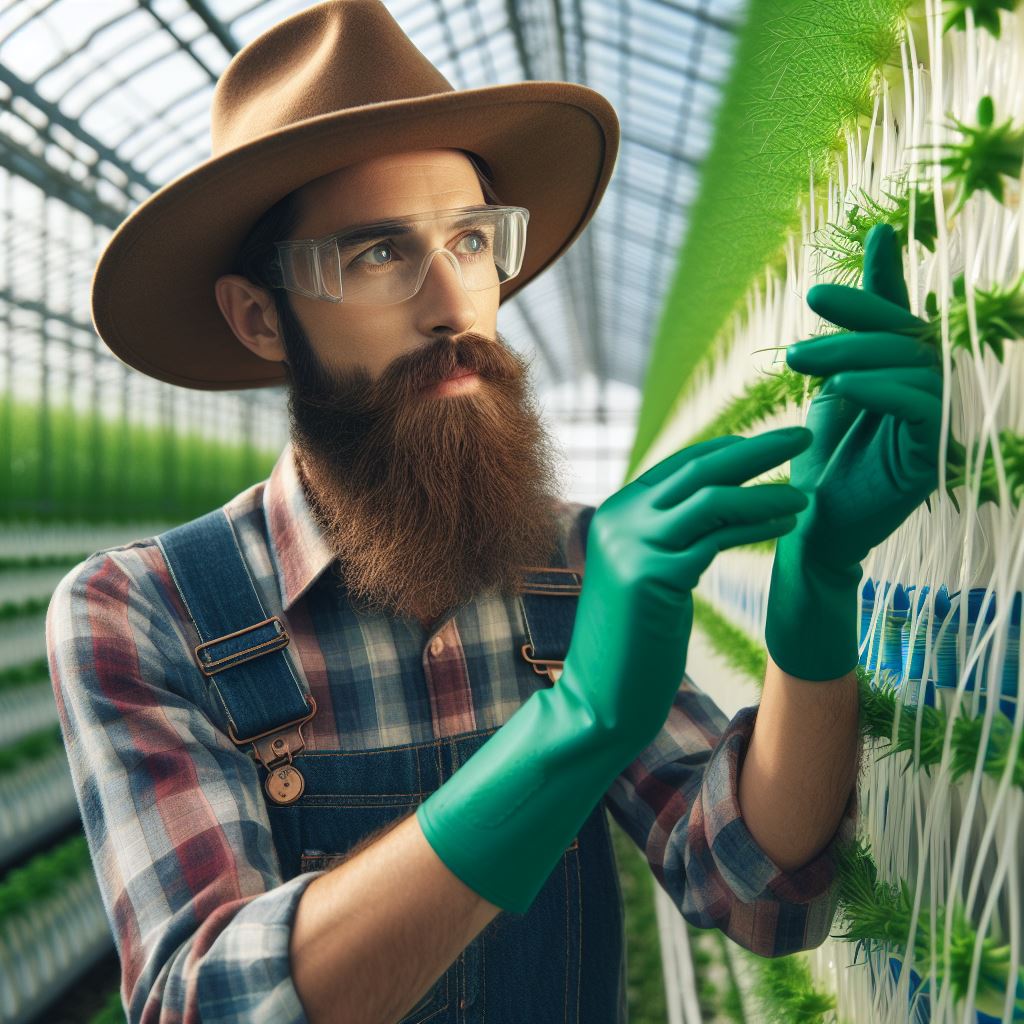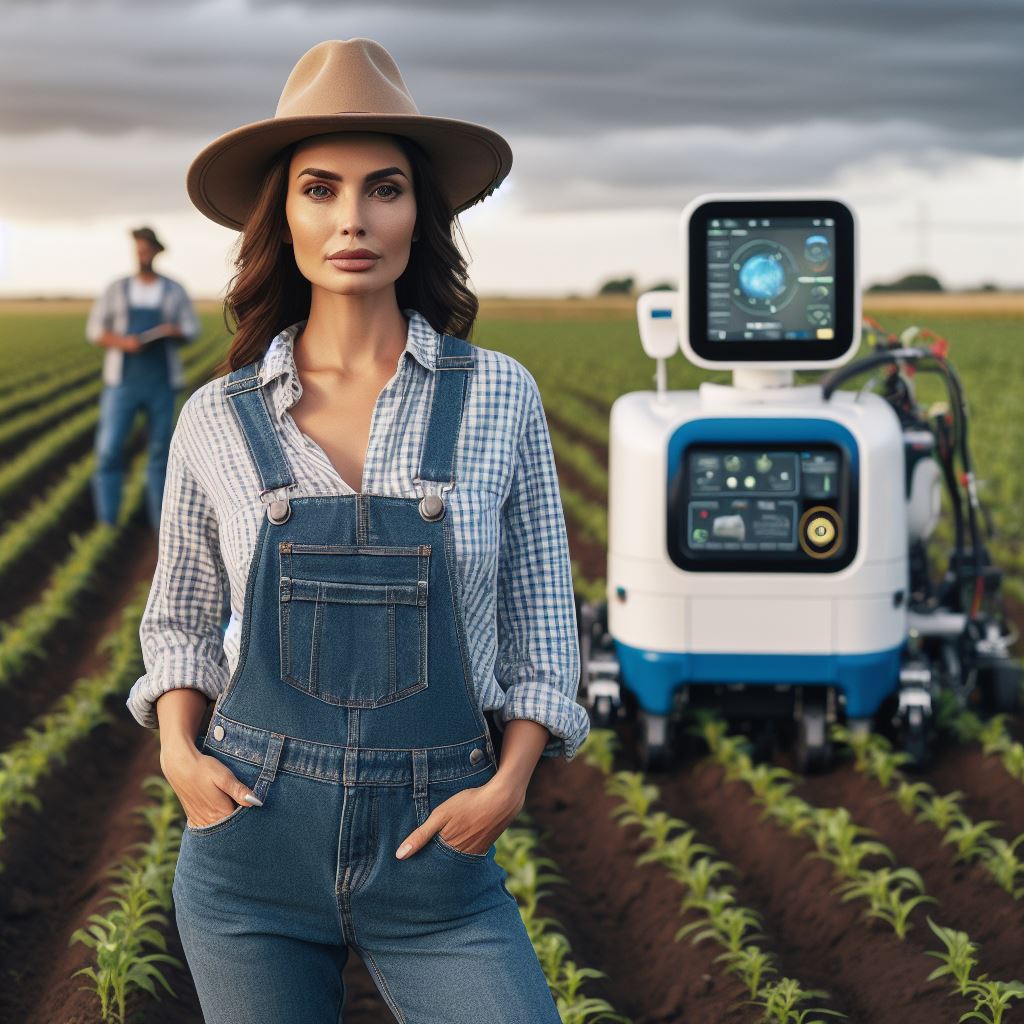Introduction
Definition of sustainable agriculture
Sustainable Agri Biotech is an innovative farming approach that strives to tackle the challenges of food production in a rapidly changing world.
It focuses on meeting the present needs of the population without compromising the ability of future generations to meet their own needs.
Biotechnology plays a vital role in achieving sustainable agriculture by utilizing genetic engineering techniques to improve crop characteristics.
By introducing genes from other organisms, scientists can enhance the resistance of crops to pests, diseases, and environmental stresses.
This allows farmers to produce higher yields with reduced reliance on chemical pesticides and fertilizers.
Biotechnology also enables the development of crops that are more nutritious and have a longer shelf life, reducing food waste.
Importance of sustainable agriculture
The importance of sustainable agriculture cannot be overstated.
With the global population projected to reach 9.7 billion by 2050, there is an urgent need to produce more food while minimizing the environmental footprint.
Sustainable agriculture practices help protect soil and water resources, prevent soil erosion, and reduce greenhouse gas emissions.
Moreover, sustainable agriculture promotes economic stability by providing farmers with long-term strategies for improved productivity and profitability.
It supports rural communities by creating job opportunities and promoting local food systems.
Additionally, sustainable agriculture fosters biodiversity and preserves natural habitats, contributing to overall ecosystem health.
Basically, sustainable agriculture is essential for addressing the growing food demands while mitigating environmental impacts.
Biotechnology plays a crucial role in ensuring sustainable agriculture by enhancing crop traits and reducing reliance on harmful chemicals.
By adopting sustainable agricultural practices, we can create a greener and more resilient future for generations to come.
Transform Your Agribusiness
Unlock your farm's potential with expert advice tailored to your needs. Get actionable steps that drive real results.
Get StartedRead: Farm Tech: AI for Sustainable Growth
The benefits of biotech in sustainable agriculture
Increased crop yields
Biotechnology has revolutionized sustainable agriculture by providing numerous benefits.
One of the primary advantages is the ability to increase crop yields.
Through genetic modification, scientists have been able to enhance productivity in crops.
They can introduce genes that allow plants to produce higher yields, making them more efficient and sustainable.
Additionally, biotechnology has enabled the development of drought and pest-resistant crops.
These genetically modified organisms (GMOs) can withstand harsh environmental conditions and are less susceptible to damage from pests.
As a result, farmers can achieve higher yields even in challenging agricultural regions.
Reduced environmental impact
Another significant benefit of biotech in sustainable agriculture is the reduced environmental impact.
By using GMOs, farmers can decrease their reliance on chemical pesticides.
Genetically modified crops are engineered to be pest-resistant, reducing the need for regular pesticide applications.
This, in turn, minimizes harmful chemical runoff into water bodies and lowers the risk of health issues associated with pesticide exposure.
Furthermore, biotech helps preserve soil quality and biodiversity.
GM crops can be designed to promote sustainable farming practices by preventing soil erosion and nutrient depletion.
Transform Your Agribusiness Online Presence
Stand out with compelling content tailored to engage your audience and drive results. From blog posts to social media, we’ll create what your business needs to grow.
Get StartedThese crops also minimize the need for extensive land clearance, allowing for the conservation of natural habitats and wildlife.
Improved nutritional value
Biotechnology has the potential to address nutritional deficiencies and enhance the nutritional value of crops, contributing to improved global health.
Through a process known as biofortification, scientists can introduce essential nutrients into crops.
This ensures that the food grown is enriched and contains higher levels of vitamins, minerals, and other beneficial compounds.
Additionally, biotech assists in combating malnutrition and food security.
By developing crops with enhanced traits, such as increased vitamin content or resistance to specific diseases, biotech can help alleviate nutritional deficiencies and ensure a stable food supply for vulnerable populations.
Essentially, biotechnology plays a crucial role in sustainable agriculture and offers a range of benefits.
It enables increased crop yields through genetic modification, allows for a reduced environmental impact by decreasing chemical pesticide usage, and improves the nutritional value of crops, addressing malnutrition and food security concerns.
Embracing biotech in agriculture can contribute to a more sustainable and prosperous future for our planet.
Read: Sustainable Crops: Less Water, More Yield Strategies
Delve into the Subject: Biofortified Foods: A Genetic Revolution
Examples of biotech advancements in sustainable agriculture
Sustainable agriculture is a pressing concern for the future of our planet.
As the world’s population continues to grow, it is crucial that we find ways to produce food in a manner that is environmentally friendly and can sustainably feed the population.
Biotechnology has emerged as a powerful tool in achieving these goals, with several advancements being made in the field of sustainable agriculture.
Unlock Farming Insights for Growth
Make smarter farming decisions with detailed reports on market trends, weather patterns, and soil health tailored to your farm's success. Boost productivity with actionable data.
Get ReportGenetically Modified Organisms (GMOs)
A notable advancement in biotech is the development of Genetically Modified Organisms (GMOs).
GMOs are organisms whose genetic material has been altered using genetic engineering techniques.
These modifications can confer various benefits to crops, making them more sustainable and resilient.
Herbicide-tolerant crops
One example of GMOs in sustainable agriculture is the development of herbicide-tolerant crops.
These crops are engineered to tolerate specific herbicides, allowing farmers to effectively control weeds while reducing the amount of herbicides used.
This not only minimizes environmental impact but also saves costs for farmers.
Insect-resistant crops
Insect-resistant crops are another application of GMOs that contribute to sustainable agriculture.
By incorporating genes from naturally insect-resistant organisms into crops, biotechnologists have created plants that are resistant to pests.
This reduces the need for chemical pesticides and promotes healthier ecosystems.
Precision farming techniques
Genetic markers for disease resistance
Precision farming techniques, made possible by biotechnology, have also played a significant role in sustainable agriculture.
Genetic markers for disease resistance allow farmers to identify crops that possess inherent resistance to certain diseases.
This precision helps in breeding and selecting crops that require fewer chemical treatments and ultimately reduce environmental contamination.
Molecular breeding
Molecular breeding methods are another precision farming technique that biotechnology has enabled.
By understanding the genetic makeup of crops, scientists can selectively breed plants with desirable traits such as increased yield, drought tolerance, and nutrient content.
This approach helps in creating more sustainable crops that are better adapted to changing climates and have lower environmental impact.
Vertical farming and urban agriculture
Efficient use of space and resources
Vertical farming and urban agriculture are innovative solutions to address the challenges of land scarcity in urban areas.
Biotechnology plays a crucial role in enabling these practices.
Vertical farming involves growing crops in stacked layers, utilizing vertical space instead of traditional horizontal fields.
This efficient use of space allows for higher crop yields and reduced energy consumption.
Year-round crop production
Furthermore, vertical farming enables year-round crop production by controlling factors such as light, temperature, and humidity.
By creating ideal conditions for plant growth, farmers can produce crops continuously, eliminating the dependence on seasonality and increasing overall food production efficiency.
In essence, biotechnology has revolutionized sustainable agriculture by offering various advancements.
Genetically Modified Organisms (GMOs) have improved crop resilience and reduced the need for chemical inputs.
Precision farming techniques and molecular breeding methods have allowed for targeted crop improvement and reduced environmental impact. V
ertical farming and urban agriculture offer efficient space usage and year-round crop production.
These biotech advancements provide hope for a more sustainable future in agriculture.
Read: Sustainable Tools: Tech in Organic Agriculture

Addressing concerns and misconceptions about biotech in agriculture
Biotechnology in agriculture has raised numerous concerns and misconceptions among the general public.
As with any new technology, it is essential to address these concerns and provide accurate information to foster a better understanding and informed decision-making.
Safety of GMOs for human consumption
Extensive regulatory approvals and testing
One of the most widespread concerns regarding biotech in agriculture is the safety of genetically modified organisms (GMOs) for human consumption.
Critics argue that GMOs may pose unknown health risks.
However, extensive regulatory approvals and rigorous testing protocols have been implemented to ensure the safety of GMOs.
Before a genetically modified crop can be approved for commercialization, it undergoes rigorous evaluation by regulatory bodies.
These evaluations consider a range of factors, including potential allergenicity, toxicity, and nutritional composition, among others.
Through this comprehensive regulatory process, GMOs that meet the strict safety standards are approved for commercial use.
Consensus among scientific community
The safety of GMOs has also been supported by the scientific community.
Major scientific organizations, including the World Health Organization (WHO), the National Academy of Sciences, and the European Food Safety Authority (EFSA), have conducted comprehensive studies and reviews, consistently concluding that GMOs are safe for human consumption.
These organizations emphasize the importance of scientific evidence and affirm the stringent safety assessments conducted before GMOs are made available to the public.
Environmental impact and biodiversity
Monitoring and managing potential risks
Another concern surrounding biotech in agriculture is its potential environmental impact and effect on biodiversity.
Critics argue that genetically modified (GM) crops may result in unintended negative consequences, such as the creation of superweeds or harm to beneficial insects.
To address these concerns, it is essential to closely monitor and manage potential risks associated with biotech farming practices.
Coexistence of conventional and biotech farming
Regulatory frameworks require extensive environmental risk assessments before the commercial release of GM crops.
These assessments evaluate potential environmental impacts, including gene flow to wild relatives, effects on non-target organisms, and the potential for increased herbicide use.
By considering these factors, regulatory bodies can determine whether the benefits of biotech crops outweigh the potential risks.
Furthermore, conventional and biotech farming can coexist and contribute to biodiversity conservation through the implementation of proper management practices.
Farming techniques such as crop rotation, buffer zones, and biological pest control can minimize potential negative impacts on biodiversity.
By adopting these practices, farmers can ensure that both conventional and biotech farming methods are sustainable and environmentally responsible.
Ethical and socioeconomic considerations
Farmers’ choice and economic benefits
Addressing concerns about biotech in agriculture extends beyond health and environmental impacts; ethical and socioeconomic considerations are crucial as well.
Critics argue that adopting biotech crops restricts farmers’ freedom and consolidates power within the seed industry.
However, it is important to recognize that farmers ultimately have the choice to adopt biotech crops based on their individual circumstances and ethical considerations.
Access to technology for developing countries
Moreover, biotechnology can provide economic benefits to farmers.
By cultivating genetically modified crops, farmers can improve yield, reduce pesticide use, and increase profitability.
The economic benefits associated with biotech crops have been demonstrated in both developed and developing countries, providing farmers with greater economic stability and opportunities for growth.
Perhaps the most significant ethical consideration lies in providing access to biotech technology for developing countries.
Biotech crops have the potential to address the challenges of food security, increase crop resilience to climate change, and reduce reliance on chemical inputs.
It is essential to facilitate access to these technologies, allowing developing countries to harness the benefits of biotech in agriculture and promote sustainable farming practices.
In a nutshell, addressing concerns and misconceptions about biotech in agriculture is vital to foster understanding and informed decision-making.
Extensive regulatory approvals, scientific consensus, and environmental management strategies ensure the safety and sustainability of biotech farming practices.
Ethical considerations emphasize the freedom of choice for farmers and the potential socioeconomic benefits of adopting biotech crops.
By addressing concerns, we can embrace the green edge of biotech and promote sustainable agriculture for the future.
Read: Sustainable Ag Tech: What’s New?
Conclusion
Recap of the advantages of biotech in sustainable agriculture
Biotechnology offers powerful tools for sustainable agriculture.
Genetic engineering can create pest-resistant and drought-tolerant crops, reducing pesticide use and water consumption.
Genome editing tweaks plant genes, accelerating selective breeding.
Big data and AI help model complex agricultural systems, informing greener practices.
Sensors monitor soil health in real time. Overall, biotech increases productivity while lowering environmental impacts.
Call to promote and support biotech research and adoption
Agriculture is facing urgent challenges from climate change, soil degradation, and ballooning food demand.
We must rapidly develop and adopt cutting-edge technologies to meet these challenges sustainably.
Increased investment in agricultural biotech research is critical.
Policymakers should promote biotech adoption by farmers through incentives and infrastructure development.
Public-private partnerships can spur innovation.
With the right policies and resources, biotech can transform agriculture.
Importance of science-based decision-making in agriculture
All agricultural decisions should be grounded in rigorous, transparent science.
Knee-jerk opposition to new technologies wastes opportunities for sustainability.
Each application of biotech should get full, evidence-based assessment on a case-by-case basis.
Biotech solutions with proven benefits should be broadly implemented.
With open-minded, science-based policies, we can leverage biotechnology’s immense potential for sustainable food production.
The future depends on sustainable agriculture. Biotechnology provides invaluable tools to achieve sustainability.
With them, we can nourish a growing population while protecting the planet.
Agriculture’s high-tech revolution has begun – it’s up to us to make it green.




